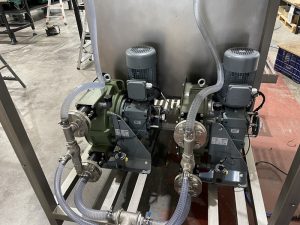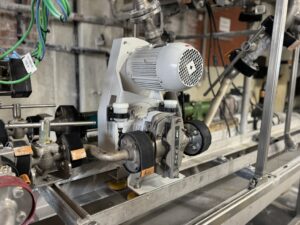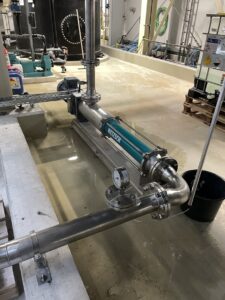Rotary Lobe Pump Ensures Precise and Gentle Transport of Base Wine from Cellar to Bottler

Precision and diligence are crucial for winemaking during the entire production and bottling process to ensure consistent quality. The Italian winery FERRARI F.lli Lunelli S.p.A. applies the same standards to the technical equipment they use. (Image source: NETZSCH Pumpen & Systeme GmbH)
It usually takes only one sip after opening a bottle of wine to determine whether it will be the perfect addition to a pleasant evening or go straight down the drain. To prevent the latter, precision and diligence are required during the entire production and bottling process in order to ensure consistent quality across all types. The Italian winery FERRARI F.lli Lunelli S.p.A. also demands this from the technology used to ensure that undesirable reactions such as oxidation or foaming do not occur when the base wine is transferred from the secondary tank to the filler for the tirage. This can significantly impact the purity and taste of the wine as excessive contact with oxygen and mechanical swirling distort the delicate aromas and the structure of the wine. Until recently, the company were using a rotary lobe pump with gearbox, which required oil as a lubricant, for this transfer task. “These pumps pose an unnecessary risk because contamination with lubricant oil would mean that the entire production batch has to be discarded,” explains Erwin Weber, Sales Director EMEA at NETZSCH. The winery therefore decided to replace the old pump as a preventive measure and contacted the experts for complex fluid handling from NETZSCH. Thanks to its many references, the worldwide active company with headquarters in Germany is globally regarded as a point of reference for small and large wineries who need pump technology that does not damage the product while ensuring reliability and low operating costs.
No contamination with lubricants thanks to the oil-free belt drive
“FERRARI was looking for a pump with good suction power and precise dosing for transporting the product without foaming,” reports Weber. “In addition to this, they wanted it to be mounted on a trolley – like the previous pump – so it could be moved between tanks.” After initial discussions and a visit to the future place of use, NETZSCH recommended TORNADO T.Sano to the winery: These models are designed specifically for pumping sensitive media in environments with high hygiene standards. As a unique, oil-free belt drive acts as the motor in these pumps, contamination of the product with lubricant is excluded. To meet the high requirements, the pump design was adapted to prevent foaming and maintain the flavour integrity of the wine. “Following our principle of ‘You have the application, we have the solution!’, the pump was designed in such a way that the shape of the rotors avoids unnecessary swirling of the product. In addition, the chambers' volume is tailored exactly to the typical flow rates of 3,500 – 8,000 l/h at this winery to avoid excess mechanical influence on the wine and ensure optimum flow rate without pulsations or shear forces.
At the same time, the pumps design has no gaps, screws or other areas where the medium, i.e. the wine, could stagnate. This means that an accumulation of residue and impurities cannot occur in the first place. These would be difficult to remove and could significantly impact the quality of the wine. The wine is in constant and even motion, and precise dosing or flow rate control is ensured. “This presents two advantages: Firstly, the bottles can be filled with exactly the same amount of fluid each time. Secondly, this solution saves wine and money without great effort, which optimises the production process,” adds Erwin Weber.
Efficient cleaning and maintenance without disassembly
Another very important aspect for FERRARI F.lli Lunelli S.p.A. was that the new pump should require as little maintenance from the local employees as possible. “Our commitment to quality is exceptionally high in this area as well, which is why we focus on a low-maintenance design for our pumps so that our promise of Proven Excellence is utilised in all areas,” says Weber. Operators can use the proven cleaning-in-place (CIP) process and subsequently the sterilisation-in-place (SIP) process to ensure efficient cleaning. These allow the system to be cleaned and sterilised using a circulation or flow-through process – no disassembly required. If smaller maintenance tasks are required despite the long service life, these can be carried out without having to remove the pump from the pipe, thanks to the FSIP solution. The setting device installed in front of the pump cover can be used to position the rotary lobes optimally after maintenance, without any expensive special tools.
And even if a part needs to be replaced, NETZSCH can react quickly and reliably: In addition to a 24-hour emergency service, which includes service as well as technical support, the company keeps sufficient stock of parts so that downtime can be kept as low as possible, no matter where in the world the pumps are being used, or old units from other manufacturers have to be replaced with new systems. “We can ensure this thanks to our global network of more than 2,500 employees at five development and production sites as well as 30 sales companies and more than 200 NETZSCH representatives,” adds Weber. No problems have arisen since the new pump was commissioned. “The vintners in northern Italy were so convinced by the efficiency of our pumps that they ordered a second pump straight away, which will be integrated into the filling processes in Trento,” summarises Erwin Weber.
Source: NETZSCH Pumpen & Systeme GmbH







